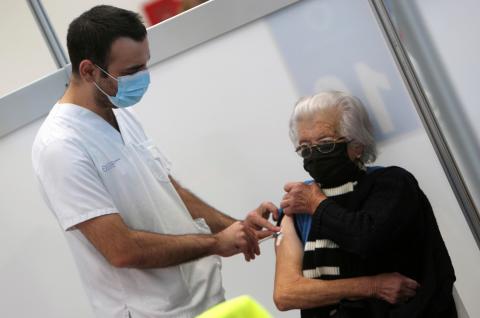Reaction to study analysing the prevalence of acute myocarditis in covid-19 patients
A paper published today in the journal Circulation concludes that acute myocarditis is a rare complication in patients hospitalised with covid-19 and that the severity of its prognosis depends on the simultaneous presence of pneumonia.

Pilar Martín Fernández - miocarditis
Pilar Martín Fernández
Head of the Inflammation Regulatory Molecules group at the Spanish National Centre for Cardiovascular Research (CNIC)
The mortality rate of covid-19 is estimated to be less than 1%, and is mainly due to severe acute respiratory syndrome and multi-organ dysfunction. However, cardiovascular complications of covid-19 have received less medical attention despite the fact that myocarditis has been recognised as a cause of death in some covid-19 patients. This is probably due to the lack of comprehensive studies on the prevalence of myocarditis as a consequence of covid-19.
The present retrospective study was conducted in 23 hospitals in the United States and Europe and included 56,963 covid-19 patients. The result provides fairly strong evidence that the prevalence of myocarditis in people with covid-19 is around 2.4 per 1,000 hospitalisations. Of particular relevance is the fact that approximately 39% of these patients developed fulminant myocarditis requiring temporary inotropic or mechanical support. In addition, the mortality of these patients during hospitalisation was 20 %.
It is established that the pathophysiology of covid-19-related myocarditis is a combination of direct viral injury and cardiac damage due to the host immune response. However, the study of this pathology in the pandemic has been hampered by problems in reaching an accurate diagnosis of myocarditis. Today the gold standard technique for the diagnosis of acute myocarditis remains endomyocardial biopsy, but it is not routinely performed in clinical practice because it is a highly invasive test and carries a number of risks to the patient. In addition to biopsy, cardiac magnetic resonance imaging is used in routine clinical practice to diagnose this pathology, but it is an expensive technique that is not available in all hospitals. In this study, both biopsy and cardiac MRI have been used to diagnose myocarditis, allowing us to establish the approximate prevalence of this serious cardiac complication in covid-19 patients.
This is a retrospective study, so there could be a bias in patient selection. Furthermore, of the patients with myocarditis included, only 17 were diagnosed with the gold standard technique, endomyocardial biopsy, which could lead to confusion in the inclusion and final diagnosis of the remaining patients included, even though their final diagnosis was made with magnetic resonance imaging, which is the technique most commonly used in clinical practice.
The study shows that acute myocarditis is a possible clinical entity associated with covid-19. This heart disease may or may not present in association with pneumonia, although concomitance of both has a worse prognosis. The use of corticosteroids in these patients with myocarditis appears to be safe as in most cases it restores left ventricular function. These findings are useful in clinical practice, and encourage physicians to make more accurate diagnoses in patients with covid-19 who present with chest pain, dyspnoea or elevated troponins.
Sergio Flores - miocarditis
Sergio Flores Villar
Head of Paediatric Cardiology at the Hospital Universitario Mutua Terrassa
There is now scientific consensus that the covid-19 virus is not only a respiratory virus that causes pneumonia, but also affects the cardiovascular system.
An article in The Lancet: Child and Adolescent Health in August 2020 describes a case of acute fulminant myocarditis due to SARS-CoV-2 in a Brazilian girl who died. At necropsy, electron microscopy showed inclusion of virus in cardiac cells.
In this article in Circulation, a multicentre participation of European and US hospitals clarifies the prevalence of acute myocarditis caused by covid-19 virus using patients detected from February 2020 to April 2021.
Cases with diagnoses of acute myocarditis caused by SARS-CoV-2 virus, detected by endocardial biopsy or cardiac magnetic resonance imaging associated with troponin T elevation and accompanying symptomatology, are clearly selected. Suspected cases that did not meet the diagnostic criteria established by international cardiological societies were discarded.
It is a rare disease and may be present in covid-19 with a prevalence of 2.4 to 4.1 cases per 1,000 hospitalised patients, with a mean age of 38 years, more frequent in men than in women. The association with covid-19 pneumonia is the most frequent form of presentation, as well as the one that causes the highest mortality (5 to 8 deaths per 1,000 hospitalised patients).
This paper describes in detail the clinical, analytical and echocardiographic features of cases with probable acute myocarditis due to SARS-CoV-2. It is the most detailed, extensive and scientifically rigorous review published to date at the medical level.
Eduardo Oliver - miocarditis
Eduardo Oliver
Head of the Experimental Pharmacology and New Targets in Cardiopulmonary Disorders Group at the Margarita Salas Biological Research Centre - CSIC
This multi-centre retrospective study analyses the evolution of 112 patients, from 23 mainly European and three US hospitals, with suspected acute myocarditis - a highly lethal inflammatory disorder of the heart if not treated in time - among a total of nearly 57,000 patients who have had covid-19 during the first four waves between February 2020 and April 2021.
The study confirms suspicions based on previous observations that SARS-CoV-2 infection may be implicated in causing acute myocarditis in some patients.
While the study shows that the percentage of patients with covid-19 who develop this type of cardiac disorder is relatively low (between 2-4 per 1,000), it highlights the seriousness of the effect and the importance of early detection and proper treatment to prevent associated deaths.
The study shows that those patients with acute myocarditis who also showed severe respiratory complications associated with covid-19 were almost 40% more likely to experience fulminant shock and 15% more likely to die. None of the patients with acute myocarditis but without pneumonia died.
While the study shows robust conclusions, it is important to be aware of the potential bias that can be introduced by such retrospective observational studies, as the authors themselves point out. In addition, diagnosis of acute myocarditis is generally difficult and requires specific markers and standardised criteria, which may have helped to underestimate the number of patients with acute myocarditis.
Finally, it is important to note that the study was conducted in patients under 70 years of age, during the first four waves, so it is not possible to estimate what impact the omicron variant, currently widespread worldwide, might be having on the incidence of acute myocarditis. In addition, none of the patients had been vaccinated before the onset of acute myocarditis symptoms, so we cannot extrapolate the results to vaccinated individuals.
- Research article
- Peer reviewed
- Non-randomized
- Observational study
- People



